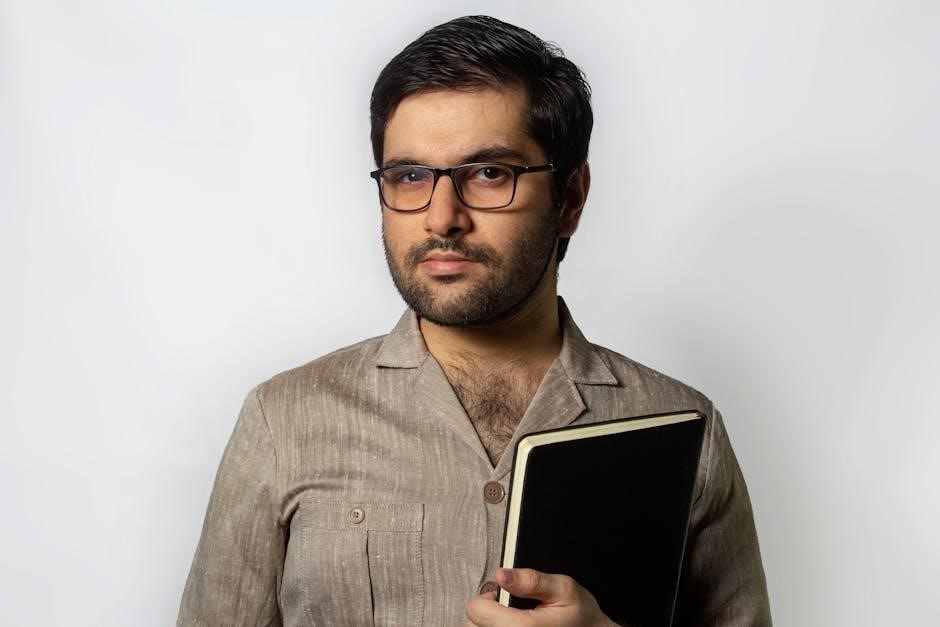Act 3 explores Macbeth’s paranoia, Banquo’s murder, and Lady Macbeth’s growing guilt, highlighting the destructive consequences of ambition and the supernatural’s role in their downfall.

Act 3 of Macbeth delves into the aftermath of Duncan’s murder and Macbeth’s ascension to the throne. Now king, Macbeth becomes increasingly consumed by paranoia, fearing Banquo’s descendants will overthrow him, as prophesied by the witches. To prevent this, Macbeth hires murderers to kill Banquo and his son Fleance. Banquo is slain, but Fleance escapes, intensifying Macbeth’s turmoil. Lady Macbeth, once a driving force behind Macbeth’s ambition, begins to show signs of guilt and anxiety over their crimes. The act culminates in a royal banquet where Macbeth is haunted by Banquo’s ghost, symbolizing his spiraling guilt and paranoia. These events highlight the destructive nature of ambition and the moral consequences of Macbeth’s actions, as his reign becomes marked by violence, fear, and psychological unraveling.
Scene 1: Macbeth’s Decision to Kill Banquo
In Scene 1 of Act 3, Macbeth’s paranoia intensifies as he reflects on the witches’ prophecy that Banquo’s descendants will rule Scotland. Fearing a threat to his power, Macbeth decides to eliminate Banquo and his son Fleance. He rationalizes this decision by believing Banquo suspects him of Duncan’s murder and may act against him. Macbeth hires two murderers, manipulating them by appealing to their loyalty and offering rewards. His justification for the murder is rooted in self-preservation and the desire to secure his throne, revealing a deepening ruthlessness and moral decay. This scene highlights Macbeth’s growing tyranny and the destructive influence of unchecked ambition, as he takes drastic measures to prevent the prophecy from unfolding.

Scene 2: The Murder of Banquo
In Scene 2 of Act 3, Macbeth’s plan to eliminate Banquo unfolds as the murderers ambush Banquo and his son Fleance. The setting is dark and secretive, emphasizing the sinister nature of the act. Banquo is killed, but Fleance manages to escape, leaving Macbeth’s plan incomplete. The murderers, motivated by Macbeth’s promises of reward and loyalty, carry out the deed ruthlessly. Banquo’s death marks a turning point in Macbeth’s reign, as his actions become increasingly violent and tyrannical. The escape of Fleance, however, introduces a new layer of tension, as Macbeth remains uneasy, fearing the fulfillment of the witches’ prophecy. This scene underscores Macbeth’s growing paranoia and the moral consequences of his decisions, while also highlighting the chaos and instability that permeate Scotland under his rule.
Scene 3: The Murderers’ Deception
In Scene 3 of Act 3, the murderers report back to Macbeth, falsely claiming that both Banquo and Fleance have been killed. The scene is marked by deception and tension, as the murderers attempt to hide their own moral unease while delivering the news. Macbeth, consumed by paranoia, reacts with a mix of relief and anxiety upon hearing that Banquo is dead but becomes enraged when he learns of Fleance’s escape. The murderers’ deception highlights their own internal conflict, as they grapple with the morality of their actions. This scene underscores Macbeth’s growing instability and the chaotic consequences of his decisions, as well as the murderers’ reluctant complicity in his crimes. The interaction between Macbeth and the murderers reveals the deepening distrust and fear that permeate the play, setting the stage for further tragedy.
Scene 4: The Banquet and Banquo’s Ghost
In Scene 4 of Act 3, Macbeth hosts a royal banquet to celebrate his kingship, but the evening is overshadowed by his guilt and paranoia. When Macbeth sees Banquo’s ghost sitting in his place, he becomes visibly disturbed, delivering a madman’s soliloquy that alarms his guests. Lady Macbeth intervenes, dismissing Macbeth’s behavior as a trivial fit, but the tension is palpable. The ghost, visible only to Macbeth, symbolizes his overwhelming guilt and the supernatural consequences of his actions. Banquo’s presence haunts Macbeth, reminding him of his crimes and the prophecy that Banquo’s descendants will rule Scotland. The scene highlights Macbeth’s psychological unraveling and the growing fear among his nobles, who begin to question his sanity. This moment marks a turning point in Macbeth’s reign, as his paranoia and guilt consume him, foreshadowing his eventual downfall. The banquet becomes a chilling spectacle of Macbeth’s inner turmoil.

Themes in Act 3
Ambition drives Macbeth’s ruthless actions, guilt haunts his conscience, and loyalty crumbles, revealing the destructive power of unchecked ambition and the moral decay of betrayal and paranoia.
Ambition and Its Consequences
In Act 3, Macbeth’s ambition evolves from a motivating force to a destructive obsession. Fearing Banquo’s descendants may seize the throne, as prophesied by the witches, Macbeth orders Banquo’s murder. This act underscores the corrupting influence of ambition, as Macbeth’s desire for power leads him to commit atrocities. His paranoia intensifies, driving him to isolate himself morally and emotionally. The consequences of his actions are evident in the chaos and violence that engulf Scotland. Macbeth’s transformation from a noble warrior to a tyrannical ruler illustrates the tragedy of unchecked ambition, highlighting how it consumes and destroys both the individual and the realm.
Guilt and Paranoia
In Act 3, guilt and paranoia dominate Macbeth’s psyche, intensifying his psychological turmoil. Haunted by Banquo’s ghost at the banquet, Macbeth’s paranoia reaches its peak, revealing his deep-seated guilt over the murder. His erratic behavior alarms his guests, showcasing the toll of his crimes. Lady Macbeth, though initially dismissive of guilt, begins to express concern, hinting at her own internal turmoil. The murders Macbeth orchestrates escalate his paranoia, as he becomes convinced Fleance’s survival threatens his rule. This relentless cycle of guilt and fear drives Macbeth further into madness, isolating him from his allies and unraveling his moral fabric. The interplay of guilt and paranoia underscores the devastating consequences of Macbeth’s actions, transforming him into a tyrant consumed by his own mind.
Loyalty and Betrayal
Loyalty and betrayal are central themes in Act 3, as relationships crumble under the weight of ambition and deceit. Macbeth betrays Banquo, once his loyal friend, by orchestrating his murder, driven by fear of the witches’ prophecy. Banquo, suspicious of Macbeth’s rise to power, contemplates the possibility of betrayal, heightening tension. The murderers, though loyal to Macbeth’s orders, hesitate, revealing moral conflict. Fleance’s escape undermines Macbeth’s plan, intensifying his paranoia. Lady Macbeth’s concern for Macbeth’s actions suggests a fracture in their alliance. The breakdown of loyalty and trust isolates Macbeth, as his subjects grow wary of his tyrannical behavior. This theme underscores the destructive nature of betrayal and the erosion of trust, reshaping the play’s moral landscape and driving characters toward their tragic fates. The interplay of loyalty and betrayal highlights the devastating consequences of ambition and deceit.

Key Motifs in Act 3
Supernatural elements, light-dark contrasts, and blood imagery dominate, symbolizing guilt, paranoia, and moral decay, while foreshadowing the consequences of betrayal and ambition’s destructive power.
The Supernatural
The supernatural plays a central role in Act 3, intensifying Macbeth’s paranoia and guilt. The witches’ prophecies continue to haunt Macbeth, fueling his fear of Banquo’s descendants and driving his ruthless actions. Banquo’s ghost appears during the banquet, symbolizing Macbeth’s psychological torment and the inescapable consequences of his crimes. This supernatural presence underscores the moral decay and the idea that Macbeth’s actions have disturbed the natural order. The ghost serves as a visible reminder of Macbeth’s guilt, while the witches’ lingering influence creates tension and foreshadows future events. These elements highlight the destructive power of ambition and the inevitability of justice, reinforcing the tragic nature of Macbeth’s downfall. The supernatural thus remains a pivotal force in shaping the play’s themes and driving the plot forward.
Light and Darkness
Light and darkness in Act 3 symbolize the moral and emotional turmoil of the characters. Light represents truth and innocence, while darkness embodies evil and deception. Macbeth’s reign is marked by spiritual darkness as he descends into tyranny, isolating himself morally and emotionally. The murderers carry out their deeds under the cover of night, emphasizing the secretive and sinister nature of their actions. Banquo’s ghost, a supernatural element, appears in the darkness of the banquet, haunting Macbeth and symbolizing his guilt. Lady Macbeth, once a symbol of ambition, now struggles with her own inner darkness as her conscience begins to unravel. The interplay of light and darkness highlights the characters’ moral decay and the chaotic world they inhabit, reinforcing the tragic consequences of their choices and the destructive nature of unchecked ambition.
Blood Imagery
Blood imagery in Act 3 of Macbeth serves as a potent symbol of guilt, violence, and consequences. Macbeth’s hands, already metaphorically stained with Duncan’s blood, now confront the literal blood of Banquo. The murderers return with bloodied daggers, a grim reminder of their deed. Banquo’s blood symbolizes the irreversible nature of Macbeth’s actions, haunting him during the banquet. Lady Macbeth, though not directly involved in this murder, is psychologically tormented by the bloodstains of her past actions, reflecting her internal turmoil. The recurring motif of blood emphasizes the moral corruption and the inescapable burden of sin that both Macbeth and Lady Macbeth carry. This imagery reinforces the themes of guilt, paranoia, and the destructive nature of unchecked ambition, leaving a lasting impact on the characters and the audience alike.

Character Analysis
Macbeth’s tyranny deepens, driven by paranoia and ambition. Banquo’s suspicion grows, leading to his tragic fate. Lady Macbeth’s guilt intensifies, revealing her crumbling resolve. The murderers face moral conflict, highlighting their humanity.
Macbeth’s Descent into Tyranny
Macbeth’s transformation into a tyrant accelerates in Act 3, driven by paranoia and guilt. His decision to kill Banquo and Fleance stems from the witches’ prophecy, fueling his fear of being overthrown.
The haunting by Banquo’s ghost at the banquet symbolizes Macbeth’s internal torment, revealing the psychological toll of his crimes. His once-noble character erodes, replaced by ruthless ambition and isolation.
Macbeth’s actions become increasingly violent and unpredictable, marking his descent into madness. The failure to eliminate Fleance deepens his paranoia, solidifying his reign of terror and moral decay.
This act underscores Macbeth’s tragic downfall, transforming him from a respected warrior into a tyrannical ruler consumed by guilt, fear, and the consequences of his unchecked ambition.
Banquo’s Suspicion and Fate
Banquo’s suspicion of Macbeth grows in Act 3, as he contemplates the witches’ prophecy and Macbeth’s sudden rise to power. Banquo openly expresses his mistrust, fearing Macbeth may see him as a threat.
His growing unease leads him to wonder if Macbeth orchestrated Duncan’s murder, creating tension between the two former allies. Banquo’s awareness of the prophecy makes him a potential obstacle to Macbeth’s reign.
Macbeth, driven by paranoia, orders Banquo’s murder, but Fleance escapes, intensifying Macbeth’s turmoil. Banquo’s death accelerates Macbeth’s descent into tyranny, highlighting the tragic consequences of ambition and betrayal.
Banquo’s fate serves as a catalyst for Macbeth’s guilt and paranoia, deepening the play’s exploration of loyalty, betrayal, and the supernatural’s role in shaping their destinies.
Lady Macbeth’s Growing Guilt
Lady Macbeth’s confidence and composure begin to erode in Act 3 as guilt overpowers her. Initially, she was the driving force behind Macbeth’s ambition, but now she struggles with the moral consequences of their actions.
Her famous sleepwalking scene reveals her internal torment, as she unconsciously confesses her role in Duncan’s murder, symbolizing her psychological unraveling. She expresses remorse, stating her hands are stained with blood, despite their cleanliness.
This shift from ambition to guilt highlights her vulnerability and the toll of their crimes. Her relationship with Macbeth becomes strained, as she grows concerned about his actions and the chaos they’ve unleashed.
Lady Macbeth’s transformation underscores the destructive power of guilt and the inability to escape the consequences of sin, marking her descent into a state of profound emotional distress.
The Murderers’ Moral Conflict
The murderers in Act 3 experience a profound moral conflict as they carry out Macbeth’s orders to kill Banquo and Fleance. Initially, they are reluctant and hesitant, revealing their internal struggle with the immorality of their task.
Their hesitation highlights the human conscience’s resistance to evil, even among those willing to commit violence. Despite their loyalty to Macbeth, they are haunted by the gravity of their actions, showing a glimmer of remorse.
The failure to kill Fleance intensifies their fear and guilt, as they realize the consequences of their deeds. Their moral conflict underscores the play’s themes of guilt, paranoia, and the destructive nature of unchecked ambition.
The murderers’ internal turmoil mirrors the broader moral decay in Scotland, as violence and betrayal dominate the narrative, deepening the tragic tone of the play.

Study Guide Elements
Vocabulary, key quotes, discussion questions, and summaries are essential tools for analyzing Act 3, helping students grasp themes, characters, and plot developments in depth.
Vocabulary from Act 3
Understanding key vocabulary from Act 3 enhances comprehension of themes and character development. Words like “proud” (Macbeth’s description of Banquo), “vassal” (referring to subordinates), and “plague” (symbolizing guilt) highlight Macbeth’s paranoia. The term “sin” reflects moral decay, while “pain” underscores the emotional toll of their crimes. These words emphasize the psychological and moral struggles of the characters, particularly Macbeth’s descent into tyranny and Lady Macbeth’s growing guilt. Mastering this vocabulary helps students analyze the play’s themes of ambition, guilt, and betrayal more effectively.
Important Quotes and Their Meanings
Act 3 of Macbeth contains several pivotal quotes that reveal character motivations and themes. Macbeth’s “I have no spur to prick the sides of my intent, but only / Vaulting ambition” (1.25-27) highlights his internal conflict, driven solely by ambition. Banquo’s “O, treachery! Fly, good Fleance, fly, fly, fly!” (3.3.18) underscores the betrayal and chaos following his murder. Macbeth’s haunting line, “Avaunt! Thou canst not say I did it,” (4.52) during Banquo’s ghostly appearance, reflects his guilt and paranoia. These quotes emphasize the destructive nature of ambition, the consequences of betrayal, and the psychological turmoil of the characters. They provide insight into Macbeth’s descent into tyranny and the moral decay that permeates the play, making them essential for understanding the act’s themes and character development.

Discussion Questions for Act 3
How does Macbeth’s decision to kill Banquo reveal his growing paranoia and ambition?
What role does guilt play in Lady Macbeth’s actions and decisions throughout Act 3?
Analyze the significance of Banquo’s ghost and its impact on Macbeth during the banquet.
How does the murder of Banquo affect the relationship between Macbeth and Lady Macbeth?
What does the escape of Fleance symbolize, and how does it influence Macbeth’s paranoia?
Discuss the theme of loyalty and betrayal in Act 3, using specific examples from the text.
How does Macbeth’s interaction with the murderers reflect his moral decay?
What does the supernatural element of Banquo’s ghost reveal about Macbeth’s psychological state?
How does Act 3 foreshadow future events in the play?
What message do you think Shakespeare conveys through Macbeth’s descent into tyranny?
These questions encourage a deeper exploration of Act 3’s themes, characters, and literary devices, fostering critical thinking and analysis.
Review of Key Events and Themes
In Act 3, Macbeth ascends to the throne but is consumed by paranoia, fearing Banquo’s descendants will overthrow him. He hires murderers to kill Banquo and Fleance, but Fleance escapes, intensifying Macbeth’s turmoil. During a royal banquet, Banquo’s ghost haunts Macbeth, symbolizing his overwhelming guilt and paranoia. Lady Macbeth reveals her own growing anxiety and guilt, highlighting the psychological toll of their crimes. Themes of ambition, guilt, and betrayal dominate, showcasing the destructive consequences of unchecked power. The act underscores the breakdown of trust and loyalty, as Macbeth turns against his former friend and ally. These events and themes accelerate Macbeth’s descent into tyranny and madness, setting the stage for further tragedy and highlighting the inevitable downfall of a ruler consumed by ambition and moral decay.

Connections and Foreshadowing
Act 3 connects to earlier acts through the witches’ prophecies, fueling Macbeth’s paranoia. Fleance’s escape and Banquo’s ghost foreshadow Macbeth’s eventual downfall, linking his fate to the witches’ predictions.
Links to Earlier Acts
Act 3 of Macbeth is deeply connected to earlier acts through recurring themes and character motivations. The witches’ prophecies from Act 1 resurface, fueling Macbeth’s paranoia and his decision to kill Banquo, whom he fears will fulfill the prophecy of ruling Scotland through his descendants. This mirrors Macbeth’s earlier ambition, which led to Duncan’s murder in Act 2. Banquo’s suspicion of Macbeth in Act 3 also ties back to his awareness of the witches’ predictions, creating tension between the two characters. Additionally, Lady Macbeth’s growing guilt in Act 3 reflects the consequences of her role in goading Macbeth into committing Duncan’s murder. The murderers’ moral conflict in Act 3 echoes Macbeth’s own hesitation in Act 2, highlighting the recurring theme of ambition clashing with conscience. These connections underscore the play’s exploration of fate, guilt, and the destructive power of unchecked ambition.
Foreshadowing of Future Events
Act 3 of Macbeth contains significant foreshadowing of future events that shape the play’s tragic conclusion. Banquo’s ghost appearing at the banquet forecasts Macbeth’s eventual downfall, as the ghost symbolizes the haunting consequences of his crimes. Fleance’s escape from the murderers hints at the fulfillment of the witches’ prophecy that Banquo’s descendants will rule Scotland, undermining Macbeth’s attempts to secure his throne. Lady Macbeth’s growing guilt and mental unraveling foreshadow her ultimate demise, as her conscience becomes overwhelmed by their shared sins. Additionally, Macbeth’s increasing paranoia and the rising discontent among his nobles suggest the rebellion that will form against him in later acts. These elements weave together to create a sense of inevitability, highlighting the destructive path Macbeth has chosen and the chaos that will engulf Scotland as a result of his actions.

Act 3 of Macbeth underscores the devastating consequences of ambition, guilt, and paranoia. Macbeth’s descent into tyranny and Lady Macbeth’s unraveling conscience highlight the tragic cost of their choices, foreshadowing their ultimate downfall.
Final Thoughts on Act 3
Act 3 of Macbeth is a pivotal section that accelerates the protagonist’s downfall. Macbeth’s decision to kill Banquo, driven by paranoia and ambition, marks a turning point in his transformation into a tyrant. The haunting appearance of Banquo’s ghost at the banquet symbolizes Macbeth’s overwhelming guilt and psychological unraveling. Lady Macbeth’s growing anxiety and moral conflict further highlight the destructive consequences of their actions. The escape of Fleance and the failure to eliminate him intensify Macbeth’s paranoia, foreshadowing future turmoil. This act underscores the themes of ambition, guilt, and betrayal, revealing the moral decay of Macbeth’s rule. The supernatural elements and blood imagery reinforce the tragic nature of the events, ultimately setting the stage for the inevitable downfall of Macbeth and Lady Macbeth.



